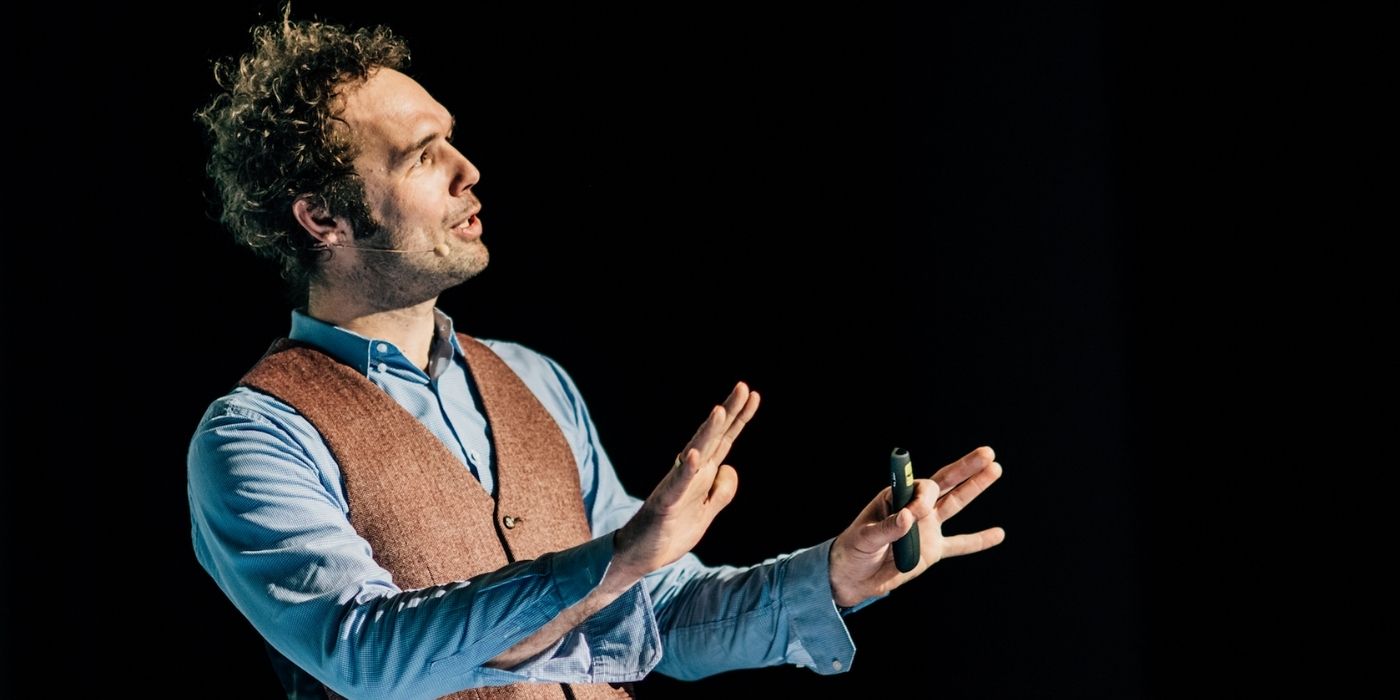Winston Churchill, John F. Kennedy, Socrates, Martin Luther King- what do they have in common? They’re some of the best public speakers in history. But why? What did these individuals have that set them apart from the rest? In these series of blog posts on keynote speakers, we’ll go through everything about public speaking and why you- need keynote speakers in your life. Where else to start than at the beginning. In the following blog post, we’ll start with the history of keynote speaking and introduce Aristotle’s three pillars of persuasion- the foundation for creating a great speech.

Where did the word keynote come from?
Keynote speeches, keynote addresses and just the mere word keynote are commonly and widely used nowadays, however, the roots of the word keynote lay in American history, more specifically, in its music. When separated, the ‘key’ in keynote refers to the crucially important tonic note or chord that sets the pitch of a musical performance. There are 24 possible keys to which a musical piece can be performed. So, giving the tonic note or three initial notes of a chord at the beginning of the performance tells all musicians and singers in which key they will perform. In this way, like a keynote speech, the musical keynote sets the tone for the entire performance or the entire event.
More specifically, the term keynote stems from a cappella singing such as doo-wap, where an indicative note is played before singing. Doo-wap was a common way to bring teenagers together in the 1940s-1950s. Hence, it is interesting that today, the figurative use of the word (keynote), also aims at bringing people together.
Keynote speeches are a subcategory of public speaking or one ‘genre’ of speech. To understand what keynotes speeches are it is useful to briefly look at the history of public speaking.
The History of Public Speaking
“Speech is the mirror of action” -Solon
Although multiple sources date public speaking back to 2,500 years ago during the reign of the Roman Empire, it actually predates the Romans. Meriam Webster, defines public speaking as “the act of or process of making speeches in public,” and we’ve been doing it for years, starting back from when cavemen told tales around campfires.

In ancient Athens, public speaking was actually an Olympic event where the winner would receive a wreath and be paraded around the city. Rhetoric as defined by Aristotle is “the faculty of discovering in the particular case all the available means of persuasion.” Athenians realized their very future depended on their ability to persuade, which is why boys were sent at the age of 14 to theoretical instruction in public speaking.

When did the formal study of public speaking begin?
The development of public speaking started with the movement from oratory rules to written rules. Back in Ancient Athens, criminal offenses were being solved by either brutal means “an eye for an eye” or rulings by the king. In 621 B.C the citizens of Athens commissioned Draco who was considered to be the wisest of the Greeks to record their rules into an organized system and so it was, that courts and juries were set up.
In 612 B.C, Solon was entrusted with writing a new constitution and it was thanks to him, that citizens could take their grievances before a magistrate and argue their case. Pericles expanded upon Solon’s work. All laws would be reviewed annually and any Athenian citizen had the right to propose or oppose a law during assembly. His achievements made Athens the crossroads for the rest of the world and the birthplace of Western democracy.
With Solons’ and Pericles’ contributions to society with courts, juries and debates on peace and war, public speaking became a more common phenomenon. Persuading individuals required elite speaking skills, which brought to the light a need for training in public speaking. Aristotle and his works would become the primary source of rhetorical theory.
Aristotle’s Three Pillars of Persuasion
In making a speech one must study three points: first, the means of producing persuasion; second, the language; third, the proper arrangement of the various parts of the speech. – Aristotle
Ethos, Logos, Pathos
Aristotle divided the means to persuade into three parts, ethos; the credibility of the speaker on the topic, logos; is the logical argumentation and rational foundation of the speech and pathos; is the emotional appeal that can be used to obtain the audience’s acceptance. His three pillars laid the foundation for what would become the structural guide for an excellent speech.
What is Ethos?
Ethos translates from Greek as “character.” Ethos stands for the credibility of the speaker. The higher the ethos, the more credible the speaker. The characteristics of ethos are trustworthiness, respect, similarity to the audience, authority, expertise and reputation. Ethos should preferably be achieved early in a speech. Once established, the audience comes to respects the speaker. Listeners then believe the speaker has a valuable message to deliver and makes them more willing to concentrate and listen to the speech.
Below is the beginning of Barack Obama’s 2012 convention speech. It provides an excellent example of how to establish credibility/ethos by setting his authority as president and taking the audience on a journey on what he’s learned during his presidency.

“Now, the first time I addressed this convention, in 2004, I was a younger man — (laughter) — a Senate candidate from Illinois who spoke about hope, not blind optimism, not wishful thinking but hope in the face of difficulty, hope in the face of uncertainty, that dogged faith in the future which has pushed this nation forward even when the odds are great, even when the road is long.
Eight years later that hope has been tested by the cost of war, by one of the worst economic crises in history and by political gridlock that’s left us wondering whether it’s still even possible to tackle the challenges of our time. I know campaigns can seem small, even silly sometimes.” – Barack Obama
In order to ensure a positive perception of ethos, speakers should research their audiences before they speak. What are the interests of their audience and what do they want to learn? Vice versa, someone organizing an event and looking to hire a keynote speaker should do their research, finding the right speaker fit for their event. When the speaker fits the event and overall theme/audience, his or her ethos is aligned and ensures better reception.
What is Logos?
Logos is derived from the word logic. Is the argument/speech logical? Are there facts and figures that support the argument? Will the audience believe the speaker?
Say a speaker is talking about the need for new product development, he might state the following to justify his argument:
“Private demand for the product has tapered off for the past three years, and this year’s sales figures are at an all-time low. It’s time to research other options.”
A speaker can achieve logos not only by facts, figures, and references but also through the structure and content of the speech.
What is Pathos?
Pathos is Greek for suffering and experience. It is an appeal to other people’s emotions. If one can create pathos, the audience will be more likely to understand the speaker, accept the arguments and be persuaded to act a certain way. More on the science of emotions in speaking under Storytelling.
An excellent example of this is the Founder of Girls Who Code, Reshma Saujani. In her speech “Why We Need Women in Tech”, she tells the story of a five-year-old child who wanted to save her dad’s life. He had recently been diagnosed with cancer. By the age of 16 she had developed a code that could detect false positives in breast cancer testing. Reshma immediately creates a bond with her audience, through the eyes of that six-year-old child, with a goal and her incredible achievements by the age of 16.
The best way to create pathos is to choose emotional points and topics and use analogies and metaphors. Analogies and metaphors help your audience envision your story as you’re telling it.
Example analogies are: Anger is like a volcano or Jealousy is a green-eyed monster. An example metaphor would be: She was the black sheep in her family or There was a heavyweight on her shoulders.
What is a keynote speech?
Today, you’ll hear the word keynote speech used more frequently than a keynote address. Keynote speeches are designed to present the central theme of a happening, such as at: a conference, a party, a seminar, an award ceremony, etc. They aim to cause a reaction, be it to trigger an emotion, amuse, educate or inspire. They are usually the main speech of an event.
What is a keynote speaker?
A keynote speaker is an individual giving a keynote speech. They often lead the event by presenting at the beginning of a conference. However, there are circumstances where there are multiple keynote speakers (in the beginning and end for instance). As its original function is music, a keynote brings the audience together and sets the overall tone of the conference.

One, very well-known keynote speaker was Steve Jobs; his highly memorable keynotes have been dubbed “stevenotes.” As mentioned earlier, the role of a keynote speaker is to raise interest in a particular topic. Whilst there are a variety of different speakers (guest speakers, inspirational speakers, motivational speakers) a keynote speaker differs from those by putting the event first and themselves second.
Hiring a keynote speaker provides your event with strategic planning by opening on the right note, bringing your audience together and setting the right tone. This is why it is so critical to secure the right keynote speaker for a specific event. What do you need to take into consideration when searching for the right fit?
What makes a good keynote speaker?
“All the great speakers were bad speakers at first.” -Ralph Waldo Emerson
There is no single factor which makes a good speaker, instead there are a multitude of factors. Whilst research shows there are many recurring attributes that the best speakers possess, what makes a good keynote speaker depends on the event in question. The overall aim, whether it is online or offline. Someone may be an excellent keynote speaker for entertainment purposes, but not for educational purposes.
In Our Next Blog
We take a deep dive into one of the biggest elements keynote speakers master- telling a good story. Did you know that with the help of storytelling, miscellaneous items purchased at a low cost from a thrift store sold with a 2,700% profit? We’ll tell you that story and more in our next blog.
References:
- https://fs.blog/2016/11/ethos-logos-pathos/
- https://bigthink.com/stephen-johnson/7-of-the-greatest-public-speakers-in-history
- https://www.linkedin.com/pulse/what-makes-great-speaker-5-qualities-can-land-you-gig-vishen-lakhiani/
- https://www.inc.com/sims-wyeth/14-must-haves-to-be-a-great-public-speaker.html
- https://questionsgems.com/questions-to-ask-guest-speaker/
- https://paulhugheslive.com/top-10-asked-questions-about-keynote-speakers/
- https://www.espeakers.com/six-questions-to-ask-a-keynote-speaker-before-your-next-virtual-event/
- https://business.tutsplus.com/tutorials/what-is-a-keynote-speech–cms-31420
- https://publicwords.com/2019/08/20/what-is-a-keynote-speech/
- https://saylordotorg.github.io/text_stand-up-speak-out-the-practice-and-ethics-of-public-speaking/s21-03-keynote-speaking.html
- https://www.shapironegotiations.com/keynote-speech-examples-learn-best/
- https://champions-speakers.co.uk/news/what-keynote-speaker-exactly
- https://theelenigroup.com/2020/08/what-is-a-keynote-speech-plus-5-steps-to-help-you-write-one/
- https://www.bigspeak.com/planning-tool/5-things-to-consider-before-booking-a-keynote-speaker/
- https://www.bigspeak.com/planning-tool/why-work-with-a-speakers-bureau/
- https://www.bigspeak.com/planning-tool/what-to-expect-when-working-with-a-speakers-bureau/
- https://www.bigspeak.com/planning-tool/how-to-hire-the-perfect-keynote-speaker/
- https://www.idoinspire.com/blog/4-types-of-keynote-speakers
- https://keynotespeakers.info/become/
- https://www.smartmeetings.com/meeting-planning/118045/what-planners-want-and-need-from-speakers-today
- https://mashedradish.com/2016/07/22/the-origin-of-keynote-is-an-incredible-lesson-in-american-history/
- https://www.npr.org/2012/09/06/160670863/harmony-teenagers-and-the-complete-story-of-doo-wop?t=1625559467725
- https://www.npr.org/2012/09/06/160670863/harmony-teenagers-and-the-complete-story-of-doo-wop?t=1625559467725
- https://www.etymonline.com/word/keynote
- https://www.etymonline.com/word/key?ref=etymonline_crossreference#etymonline_v_1829
